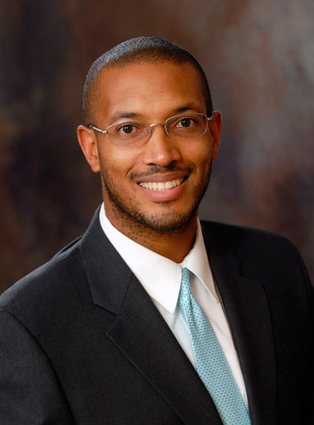Former Lab postdoc earns presidential award
 (Download Image)
Lynford Goddard
(Download Image)
Lynford Goddard
Lynford Goddard, a former postdoc in the Lab's Engineering Directorate, admits he was "speechless" and "bouncing off the walls with excitement" when he first learned he was named by President Obama as a recipient of the Presidential Early Career Awards for Scientists and Engineers (PECASE).
The prestigious award is the highest honor bestowed by the U.S. government on young professionals in the early stages of their independent research careers.
Goddard, currently assistant professor of electrical and computer engineering at the University of Illinois at Urbana-Champaign, joined the Lab's Engineering Technologies Division (ETD) as a postdoc after receiving his Ph.D. from Stanford University in 2005, and worked at the Lab until 2007.
At LLNL, he worked on two main research topics: photonic integrated circuits (PICs) for secure communications and photonic sensors for trace gas detection.
The PIC project involved simulation, design and testing of high-speed all-optical logic and memory as well as developing measurement techniques for low-loss dielectric waveguides and turning mirrors. The gas sensor project focused on hydrogen detection with novel edge-emitting laser structure that used palladium as a functionalized lateral surface coating. Both projects led to pending patents: reconfigurable all-optical universal logic gates, low loss waveguides and resonant optical transducers and tunable photonic cavities for trace gas detection.
Goddard was nominated for the presidential award by Diane Chinn, deputy division leader of ETD.
"He demonstrated tremendous potential in the way he crafted and executed his research projects," Chinn said.
Anantha Krishnan, leader for the Center for Micro and Nano Technology (CMNT), where Goddard worked, said: "While at LLNL, Lynford made outstanding and significant contributions to several programs relevant to national security and Stockpile Stewardship. He is currently continuing these critical collaborations with Lab staff members."
At LLNL, Goddard focused on the design, modeling and characterization of semiconductor active and passive devices for high-speed all-optical logic, memory, and integrated circuits for secure communications. He invented the rapidly reconfigurable all-optical universal logic gate and an architecture for photonic-field programmable gate arrays. He also conducted research on novel photonic sensors for gas detection.
"Lynford is a highly motivated and driven researcher and is truly deserving of this recognition," Krishnan said.
"The postdoc program at LLNL was a crucial phase in my professional development," Goddard said. "I was given the opportunity to develop leadership skills by serving as principal investigator on the PIC project. The experience leading a team, managing the budget and writing successful proposals was very important training for my current faculty position."
Tiziana Bond, Lynford's mentor at LLNL, added: "We have been very lucky in hiring Lynford. It has been a critical asset to the photonics research at the point that he could eventually put in the position to lead some portion of it bringing it efficiently to the next level of maturity. Lynford has demonstrated to be highly professional, acute, insightful, honest and loyal. "Lynford's dedication to innovative scientific research and education outreach deserves to be recognized and further supported. I am sure he will exploit the grant in exemplary and original ways to sustain the national needs and help keep US ahead in scientific breakthroughs and academic advancements. "We are continuing our collaboration and I foresee a long relationship between our groups in the field of photonic integrated circuits and sensors."
Goddard explained the significance of PECASE: "The award is an honor that can really change your career," he said, adding that it represents recognition for outstanding potential, not only in innovative research, but also in education, community service and potential for leadership.
"I see the award as giving me extra motivation and encouragement to excel in my work as a researcher and educator. It will truly be an honor to meet President Obama and receive an award from him." He will receive his award in the fall at a White House ceremony.
Goddard said he plans to continue developing his portfolio of research and teaching at Illinois and progressing in his career path towards tenure. "I also look forward to continuing my collaboration with LLNL and DOE through the support from the PECASE award."
President Obama noted in a press release announcing the award recipients: "These extraordinarily gifted young scientists and engineers represent the best in our country. With their talent, creativity and dedication, I am confident that they will lead their fields in new breakthroughs and discoveries and help us use science and technology to lift up our nation and our world."
The Presidential Early Career Awards embody the high priority the administration places on producing outstanding scientists and engineers to advance the nation's goals and contribute to all sectors of the economy. Nine federal departments and agencies join together annually to nominate the most meritorious young scientists and engineers — researchers whose early accomplishments show the greatest promise for strengthening America's leadership in science and technology and contributing to the awarding agencies' missions.
The awards, established by President Clinton in February 1996, are coordinated by the Office of Science and Technology Policy within the Executive Office of the President. Awardees are selected on two criteria: Pursuit of innovative research at the frontiers of science and technology and a commitment to community service as demonstrated through scientific leadership, public education, or community outreach. Winning scientists and engineers receive up to a five-year research grant to further their study in support of critical government missions.




